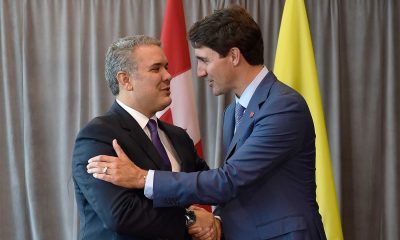Ottawa’s Ties with Far Right Colombian President Undermines Human Rights Rhetoric Regarding Venezuela

A week ago a former Canadian soldier instigated a harebrained bid to kidnap or kill Venezuelan President Nicolás Maduro. Launched from Colombia, the plot failed spectacularly with most of the men captured or killed.
Still, the leader of the invasion Jordan Goudreau, a veteran of the Canadian military and US special forces, has been remarkably forthright about the involvement of opposition figure Juan Guaidó. A leaked contract between Guaidó’s representative in Florida and Goudreau’s Silvercorp USA describes plans for a multi month occupation force, which after ousting Maduro would “convert to a National Asset Unit that will act under the direction of the [Guaidó] Administration to counter threats to government stability, terror threats and work closely” with other armed forces. Apparently, Goudreau was hoping for a big payday from Venezuela’s opposition. He also had his eyes on the $15 million bounty Washington put up in March for Maduro’s capture as well as tens of millions dollars for other members of the government.
As the plot has unraveled, Ottawa has refused to directly criticize the invasion launched from Colombia. The military has also refused to release information regarding Goudreau’s time in the Canadian forces. What’s more, since the plot began Canada’s foreign affairs minister has reached out to regional opponents of Maduro and reasserted Ottawa’s backing for Guaidó. The PM also discussed Venezuela with his Colombian counterpart.
The Trudeau government’s reaction to recent events suggest the global pandemic has not deterred them from brazenly seeking to overthrow Venezuela’s government. In a bid to elicit “regime change”, over the past couple years Ottawa has worked to isolate Caracas, imposed illegal sanctions, took that government to the International Criminal Court, financed an often-unsavoury opposition and decided a marginal opposition politician was the legitimate president.
The day after the first phase of the invasion was foiled foreign minister François-Philippe Champagne spoke to his Colombian, Peruvian and Brazilian counterparts concerning the “Venezuela crisis and the humanitarian needs of Venezuelans.” Four days later Champagne tweeted,
“great call with Venezuela Interim President Juan Guaidó. Canada will always stand with the people of Venezuela in their desire to restore democracy and human rights in their country.”
On Monday Prime Minister Justin Trudeau spoke with Colombian President Iván Duque Márque. According to the official release, they “discussed the crisis in Venezuela and its humanitarian impact in the region which is heightened by the pandemic. They underscored the need for continued close collaboration and a concerted international effort to address this challenging situation.” Over the past 18 months Trudeau has repeatedly discussed Venezuela with a Colombian president who has offered up his country to armed opponents of Maduro.
The Trudeau government has been chummy with Duque more generally. After he won a close election marred by fraud allegations then Foreign Minister Chrystia Freeland “congratulated” Duque and said, “Canada and Colombia share a commitment to democracy and human rights.” In August 2018 Trudeau tweeted,
“today, Colombia’s new President, Ivan Duque, took office and joins Swedish PM, Norway PM, Emmanuel Macron, Pedro Sánchez, and others with a gender-equal cabinet. Iván, I look forward to working with you and your entire team.”
A month later he added,
“thanks to President Ivan Duque for a great first meeting at UNGA this afternoon, focused on growing our economies, addressing the crisis in Venezuela, and strengthening the friendship between Canada & Colombia.”
But, Duque is from the extreme right — “le champion du retour de la droite dure en Colombie”, according to a Le Soleil headline. The Colombian president has undercut the peace accord the previous (right, but not far right) government signed with the Revolutionary Armed Forces of Colombia (FARC) to end Colombia’s 50-year civil war, which left some 220,000 dead. Duque’s policies have increased violence towards the ex-rebels and social activists. Seventy-seven former FARC members were killed in 2019. Even more human rights defenders were murdered. The United Nations High Commissioner for Human Rights found that at least 107 Colombian, mostly Indigenous, rights defenders were killed in 2019.
Through the first part of this year the pace at which social leaders and demobilized FARC members have been killed has increased. According to the UN observer mission in Colombia, 24 demobilized guerrillas have already been assassinated and a recent Patriotic March report on the “The other pandemic lived in Colombia” details 95 social leaders, human rights defenders and former guerrillas killed in the first four months of 2020.
Trudeau’s dalliance with Duque is difficult to align with his stated concern for human rights in Venezuela.
The same can be said for Ottawa’s failure to condemn the recent invasion attempt. The Trudeau government should be questioned on whether it was involved or had foreknowledge of the recent plot to invade Venezuela.
*
Note to readers: please click the share buttons above or below. Forward this article to your email lists. Crosspost on your blog site, internet forums. etc.
Featured image is from Presidencia de la República

